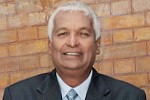 THE EDITOR: Finance Minister Winston Dookeran has woven, in his own inimitable and unique style, an underlying development and ideological philosophy/ substructure that permeates, underpins and sustains the visible superstructure/fabric of his 2010/11 fiscal and development package The concept of inclusive or balanced development that is a fundamental pillar of the economic strategy of the Partnership regime was initially conceived within the womb of the COP partner. It is pivotal to the COP Mission and Vision Statements.
THE EDITOR: Finance Minister Winston Dookeran has woven, in his own inimitable and unique style, an underlying development and ideological philosophy/ substructure that permeates, underpins and sustains the visible superstructure/fabric of his 2010/11 fiscal and development package The concept of inclusive or balanced development that is a fundamental pillar of the economic strategy of the Partnership regime was initially conceived within the womb of the COP partner. It is pivotal to the COP Mission and Vision Statements.
The baby was delivered in swaddling clothes in the composite PP manifesto. It was subsequently adopted as an official cornerstone PP policy. It is this equitable development strategy that serves as the unifying amalgam and platform. It has blended form with function to realise the delicate balance achieved by the internationally acclaimed economic guru in his latest creative blue print designed to rescue T&T from the persistently painful and nagging hangover bequeathed to us by the legacy of mismanagement and squandermania perpetrated repeatedly by the previous PNM regime.
Accordingly the inclusion of the five growth poles, the partnership/entrepreneurship theme between the public and private sectors and equitable geographical distribution of the rewards/resources of the State are only a few manifestations of this supporting pillar.
The proclamation in the Budget of the five rural to urban, diversified industrial growth poles in the Budget is innovative. They will contribute to achieving balanced development, equity as well as reinforce the former UNC policy of inclusion spawned by the Silver Fox in his 1995-2001 government.
In this context, the proposed accelerated development of the idyllic, serene and green North Coast hinterland to be fuelled by the construction of the trans-Northern Range tunnel/overland highway is no pie in the sky aberration.
In my youthful teaching days I have hiked with my young geography charges across the Range starting from Santa Cruz and accessing Maracas Bay without a sweat. There is also another easily accessible, trans-mountain route originating from Caura Valley (Tunapuna) to Rincon Trace, Las Cuevas.
In both of these existing mountain saddles/passes, with the availability of idle tunneling equipment from the building of the submarine North Sea Channel Tunnel, Belgian firm, Vinci can mobilize a team to undertake the requisite financial and physical investigations to fast track it Jack Warner-style.
Stephen Kangal
Caroni

Why do we need “growth poles”? When I hear that all I see is more wanton “development” all over the place. Meanwhile rural Trinidad is destroyed to create another Curepe clone (now there’s a pretty town!).
Everywhere does not need to be “developed”! It’s alright to have rural districts too.
The author of the article has managed to say so much without saying anything at all. Absolutely no analysis whatsoever, not even on a shallow, basic level. This is not opinion journalism, and for all its metaphors I cannot even call this article literature, because it does not force me to think about any issue other than the pointlessness of it. It even fails the test as poetry (which I hope it wasn’t trying to be), because it does not rouse the heart. Mr Kangal, try again. No one is asking you to be objective and boring and all the time. Recognize that there are people that care deeply about the issues involved in Trinidad’s economy and polity. If you are to speak to them (which you do by virtue of writing on such a topic in a relatively well-respected forum), then you are responsible for for writing with a certain degree of substance and wit. And when you fail, we have a responsibility to tell you so.
Sheree is making good sense, unlike the dictionary-reader from Caroni. To say that because Basdeo Panday had a policy of inclusion (??), digging a big hole through the northern range to bring traffic and pollution to the North Coast is now a good idea, is stretching the limits of hero-worship, even for a diehard UNC.
If you want “equitable geographical distribution of the rewards/resources of the State”, why not move a dozen or so Ministries from “Tong” to Couva, Arima, Rio Claro and Point Fortin? As the jobs go, so does the traffic! Paying a big foreign company to undertake yet another infrastructure project and then leave us to pay for its upkeep is not a driver of growth.